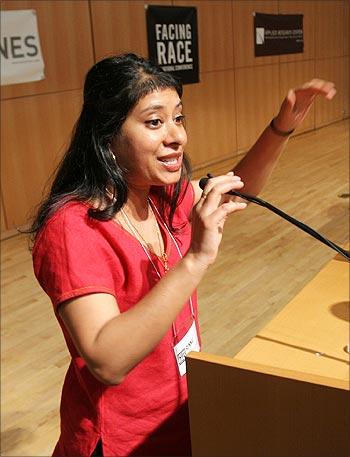 | « Back to article | Print this article |
 When Rinku Sen (see the image) took the cause of illegal immigrants to the youth panel of America's premier civil rights organizations, some participants were surprised.
When Rinku Sen (see the image) took the cause of illegal immigrants to the youth panel of America's premier civil rights organizations, some participants were surprised.
Sen, an activist for over two decades and author of the well-praised book The Accidental American: Immigration and Citizenship in the Age of Globalization, pleaded, as she has been doing for many years, the cause of illegal immigrants from across the world at the centennial celebrations of the National Association for the Advancement of Colored People.
When she suggested that people should use the word undocumented people instead of illegal immigrants because the latter description has been used to perpetuate injustice against immigrants, a young woman member of the audience was moved to protest.
Haven't these immigrants broken the law, she asked Sen, while wondering why they should be welcomed and given the benefits that accrue to legal citizens.
"I said I understand how difficult it is to talk about forgiving someone who had broken the immigration law," Sen says.
"But I had to explain that the undocumented immigrants from all over the world, from Africa, India, Bangladesh or Colombia, are here because the American system needs them. I talked about the need to reform the immigration laws and give citizenship to these immigrants."
Most of the undocumented workers are people of color, and their race plays a key role in their exploitation and ill treatment, she argued.
"In my writings and my public appearances, especially on the campuses, I have been saying that we should not look at illegal immigrants as just a pair of hands, but as someone who are indeed contributing to this country," says Sen whose books have received praise from activist-actor Danny Glover and the best-selling activist writer Barbara Ehrenreich.
Sen is president and executive director of the Applied Research Center (ARC) and publisher of Color Lines magazine. She works with a staff of more than 30 full and part timers in Oakland, California and New York City.
"I have been using journalism and organizing to further social change," Sen, who went to the Columbia Journalism School a decade ago, says. She also has significant experience in philanthropy, as vice chair of the Schott Foundation for Public Education and an Advisory Committee member of the Philanthropic Initiative for Racial Equity. Previously, she was co-director of the Center for Third World Organizing.
Sen was five when her parents migrated to America in the early 1970s. Her father worked as a mechanical engineer while her mother was a homemaker.
"My father never got a satisfactory job because of the bad economic conditions of the 1970s," she continues.
"After doing a number of jobs he wasn't happy in, he started his business and provided jobs for hundreds of people over the years. I give his example of how immigrants, even those who have to struggle a lot at the beginning, contribute to this country."
Her book, Stir It Up: Lessons in Community Organizations, commissioned by the Ms Foundation for Women, was released in the fall of 2003.
Her latest book, The Accidental American, won the Nautilus Book Award Silver Medal that honors books of transformative power.
Sen, who has also organized back-of-the restaurant workers like dishwashers, who are often grossly ill treated by their employers, wrote The Accidental American with Moroccan-born waiter Fekkak Mamdouh, one of the survivors in the destruction of the Windows on the World restaurant in the 9/11 attacks.
She intertwines the story of Mamdouh and his colleagues' struggle for just treatment while arguing for a new immigration policy, one that gives people a share of the benefits of globalization. In the end, Sen and Mamdouh argue, native-born and immigrant workers have far more in common than either realizes.
"If the immigrants have more right, the more bargaining power and public backing," she says, "it will help all workers to advance the cause."
The book proposed a new approach to immigration: A free international flow of labor to match globalization's free flow of capital, says Sen.
"After all, corporations are encouraged to move anywhere in the world they can maximize their earnings," she muses.
"People shouldn't have to risk exploitation, abuse, and even imprisonment when they try to do the same."
Some Americans may not agree with the book's thesis: 'Immigrants ought to be welcomed, not marginalized. Citizenship should ultimately be determined by how willing people are to become a part of the social, civic, and political fabric of the country they live in, not by an accident of birth.'
Sen is a realist. "It is not easy to convince all people about the worth of immigrant lives," she confesses.
"Even to convince majority of Americans would be very difficult. But we keep working at it."